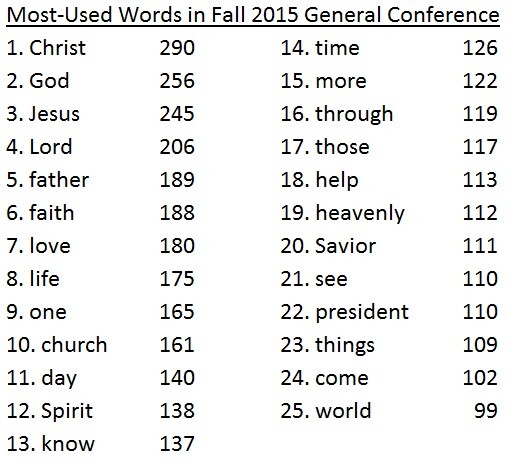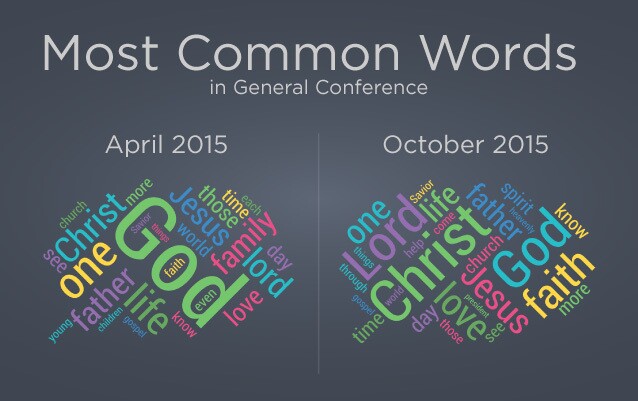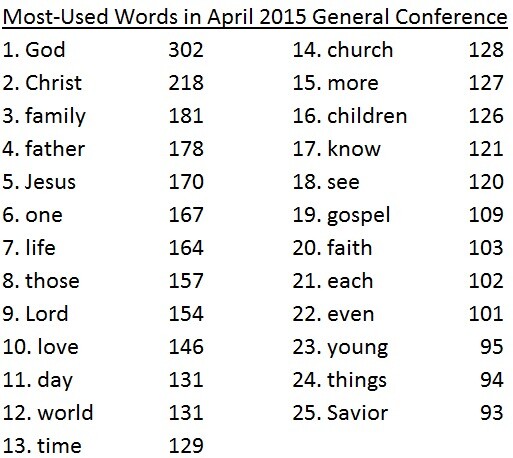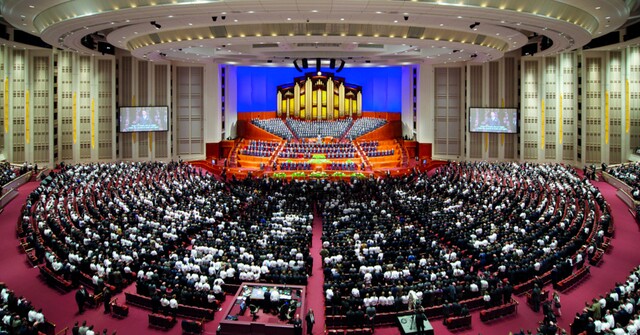Recently, I underwent a project to satisfy my personal curiosity: discovering what words were used the most during last year's general conference. I thought that if I looked at the text from a new perspective and if I really analyzed the words that were spoken, maybe new messages would somehow reveal themselves to me. Maybe I would find some deeper, surprising message that our Church leaders were trying to communicate.
The Most-Used Words in Conference Last Year
So, I copied every word spoken at all 12 sessions of general conference in 2015. Then I ran these long pieces of text (126,545 words total) through several online text analyzers to compare the outcome.
And guess what the most-used word for both general conferences was?
"The." Yep, in spring "the" was used 3,659 times and in fall it was used 3,606 times, making up approximately 6% of all of the words used. And the second most-used word? "And." Not surprisingly, this word came in with 2,383 uses in spring and 2,429 in fall, making up nearly 4% of all words used.
Though interesting from a language-use perspective, that wasn't exactly the message I was going for. But once I weeded out all of the prepositions and articles, I was left with the most-used words from general conference: the real meat of our inspired leaders' messages.
But what I found still wasn't particularly surprising:
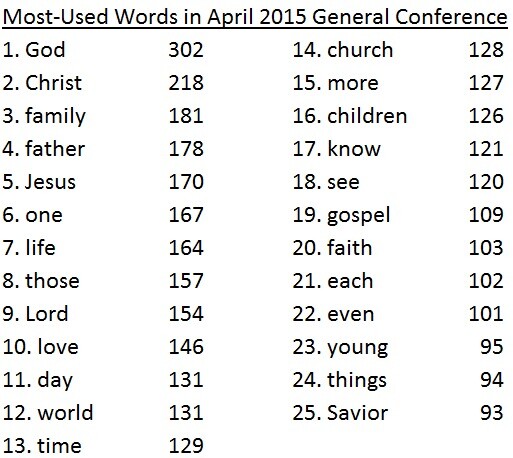
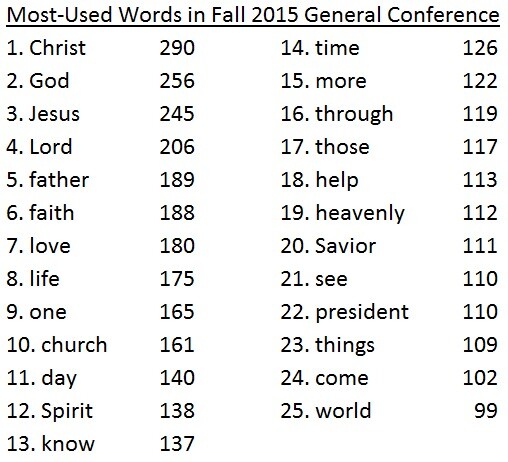
After all, wasn't it Nephi who said, as members of Christ's Church, "we talk of Christ, we rejoice in Christ, we preach of Christ, we prophesy of Christ, and we write according to our prophecies, that our children may know to what source they may look for a remission of their sins." The results of my analysis was just a little confirmation to me that the teachings of the Church have remained consistent from 600 B.C. to the present. (For an interesting read, check out why a Catholic professor said "Mormons are more Christian than many mainstream Christians" because they are "obsessed with Christ.")
Seeing the Simplicity of the Gospel
But, even though these words themselves weren't surprising, what they communicated was still encouraging, uplifting, and thought-provoking. Here, in this list of 25 words was the simplicity of the gospel that President Uchtdorf was trying to teach us about last year during fall general conference:
"Brothers and sisters, if you ever think that the gospel isn’t working so well for you, I invite you to step back, look at your life from a higher plane, and simplify your approach to discipleship. Focus on the basic doctrines, principles, and applications of the gospel. I promise that God will guide and bless you on your path to a fulfilling life, and the gospel will definitely work better for you. . . .
"Brothers and sisters, dear friends, I pray that we will focus on 'the simplicity that is in Christ' and allow His grace to lift and carry us during our journey from where we are now to our glorious destiny in our Father’s presence."
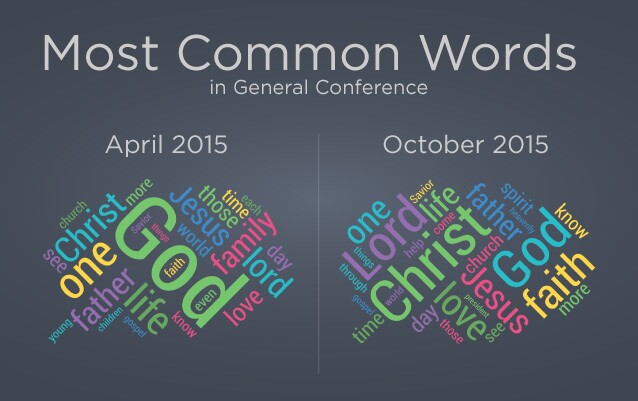
Image created by Katy Chandler.
Here in these two simple lists is harmony and a pattern, showing how our prophets, apostles, and other leaders consistently teach us about Jesus Christ, our Savior and Lord. How they teach about God who is our loving Heavenly Father, about the nature of our eternal families and the love and faith required to ensure they remain strong, about our daily life and the Spirit and gospel that can help us navigate its questions or trials, and about the one, unified Church where we, as its members, can help bring the joy of the gospel to others throughout the world.
Finding Something Unexpected
It wasn't until I started digging a little deeper into each of these words that something truly unexpected and perspective-altering came up. I took a little historical dive into the use of these words in past conferences, analyzing them using BYU's corpus of all LDS general conference talks. This tool allows you to look at how words are used over the history of the Church, how they interact with one another, and how their use might have changed.
Though "God" was the most-spoken word in April 2015 general conference and the second most-spoken word in October 2015 general conference, I quickly discovered that the use of this word has decreased over the past five decades. Interestingly enough, the word "Lord," which appears in the top 10 most-used words for both conference sessions last year, has also been in decline the past four decades.
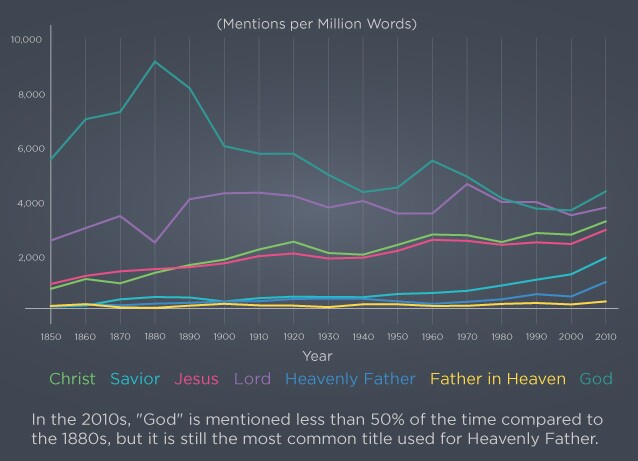
Image created by Katy Chandler.
Before jumping to conclusions, I started digging into the other words on the list, finding that our use of the words "Jesus," "Christ," and "Savior" have grown significantly as has our use of "Heavenly Father" and "Father in Heaven."
Discovering Something More
While these titles ("God" and "Heavenly Father," "Lord" and "Savior") are basically synonymous, I think the subtle but important shifts in the way Church leaders label and talk about our Heavenly Father and Savior show a focus on our personal relationship with them.
It seems to me that the prophets are now, more than ever, emphasizing God's role as a loving Heavenly Father, making our relationship with Him more personal, intimate, and relatable, all while testifying of our own divine heritage as His sons and daughters. Through their language, pleas, commands, and insights, our Church leaders demonstrate now more than ever the crucial necessity of a Savior in our lives, one who understands us, who comforts us, who mends and saves us. Because that Savior was a mortal man, just like us. He had heartaches and struggles and challenges, just like us. He lived and died, just like we will. And His name was Jesus Christ.
► You'll also like: 5 Profound Insights from The Infinite Atonement.
In my search, I also discovered that Church leaders frequently use words like "our," "loving," "loves," "gratitude," "knows," and "beloved" in connection with the term "Heavenly Father" far more in this past decade than they ever have before. And I have no doubts the messages they share have touched our hearts and helped transform the way we view God and Jesus Christ.
Our Heavenly Father and Savior aren't some distant, cosmic, inexplicable, and unembodied mass that we are striving to connect to. We know that They are beings with bodies, like us. They feel and love and even weep, like us. But most importantly, They are our Heavenly Family. They are our Father and Brother who care for us and are connected to us in ways too deep and intricate to understand, and They will do anything in Their power to reach out to us and guide us back to Them. Because that's what family does.
In a world where families are getting torn apart at the seams and love seems more and more a romantic but impractical idea, how lucky we are to have prophets and apostles who combat these ideas by sharing truth and their testimonies of our Savior and Heavenly Father and their infinite, perfect, and unwavering love for us.
Lead image from Wikimedia Commons.
